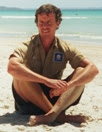Eats, shits, and leaves them at the landfill. And that's a good thing according to Kimberley-Clark.
 If it means that your company sells more disposable nappies then of course it's a good thing.
If it means that your company sells more disposable nappies then of course it's a good thing.
The strange press release claims research has "found that the impact of burying disposable nappies in landfill sites was matched by the energy consumed and greenhouse gases generated by washing reusables or transporting them to laundries."
Apparently the study was conducted by the UK Environment Agency, but all I can find about nappies on their site is a cute baby pic asking whether you've thought about washables.
K-C logic has it that stuffing nappy after disposable nappy in a hole in the ground is better for the planet than reusable nappies. Clearly they've not heard of clean energy, efficient water use, or the energy network implicit in making, distributing, selling, and trashing disposable goods.
When I find the report I'll let you know. Flick me a note if you come across it in the mean time.
Update: Thurs 12th - still no further indicator of what's in the study, but Stuff are towing the corporate line. They also refer to North Canterbury disposable nappy composters who accept this spoon fed research.
Update: Fri 13th - as it turns out, the study is two years old and has been widely discredited. Adjusting for flawed research assumptions washable nappies are 31% better than disposable in terms of climate change impact.
Update: Fri 27th - Nandor has had a crack at Michael Laws for throwing the proverbial at the fan. Laws of course accepted the Kimberley Clark "analysis" and according to Nandor, Laws thinks "it is "ridiculous" for parents to be environmentally aware". Mind you, Laws must be onto something. He got rid of kerbside recycling in Wanganui.
 Wellington City Council's landfill manager took National Radio's Our Changing World on a tour last week. The city's trash heap made for fascinating radio (13 min audio).
Wellington City Council's landfill manager took National Radio's Our Changing World on a tour last week. The city's trash heap made for fascinating radio (13 min audio).





